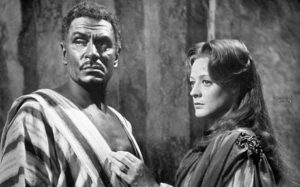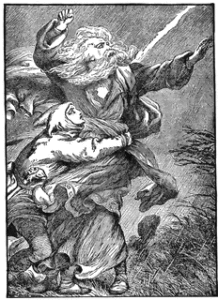I once drove several hours to see a production of King Lear. It wasn’t worth the trip. It might have been before I started this blog because I can’t find where I wrote it down, but the thing I remember the most was the big moment, the storm on the heath, and Lear … bargaining with the storm. Timid. Instead of “Come at me, give me everything you’ve got” I got a Lear that was more “I never did anything to you, please don’t hurt me.”
This weekend I saw Commonwealth Shakespeare’s production of King Lear on Boston Common. This is their 20th year, and I’ve been to 12 of them. This is, without doubt, the greatest thing I’ve seen them do. (To be fair, we’re talking about Lear here. Shakespeare’s masterpiece. It’s not like a Comedy of Errors or a Two Gents, no matter how good, is even going to be in the same conversation.)
The staging is interesting this year, showing just a backdrop of curtains (arrases?) that leave enough space for random exits and entrances, if that’s what they’re planning. I think this is oddly basic, but I like it. In the past there’s almost always been two levels to the stage, as well as a great deal of scenery (such as a crashed airplane for As You Like It, or neon signs for Two Gentlemen of Verona).
The play starts with an interpretive dance between Lear and his daughters. Right away I’m struck by something I did not expect — I cannot tell which daughter is which. I am fully expecting Cordelia to stand out from her sisters like black and white, but as they start I realize that any of them could be Cordelia. Soon the dance splits, however, and Lear clearly spends more enjoyable time with one of the girls while the other two plot and scheme to work together. They have a scarf that they are dancing with, and use it to get between Lear and Cordelia, dragging him away from her, wrapping him up, and so on. Then it gets crazy dark as they pull the scarf up over his eyes and a mob comes out to torment him, before finally dragging him offstage. Wow.
I can’t begin to describe the play in detail, because my post will be longer than the script. Instead, let’s talk about characters.
Fool. When I first tried to read and understand King Lear, I didn’t really get the Fool. Were his jokes supposed to be funny? Or profound? Does he love the king, or mock him? Or rather, since the answer is obviously “both”, is the line between the two? He clearly tries to show him, repeatedly, the folly of giving away his kingdom. But to what end? It’s too late to do anything about it. If he’s just taunting the poor man, that’s hardly what I’d call love.
I liked this Fool a lot. From the minute he dances in and jumps up on the table, I knew I liked him. The way he just keeps hammering Lear over the head with variations of “Who’s the bigger idiot? I’m not the one who gave away my kingdom” despite Lear’s half-hearted warnings for him to stop really made me appreciate the scene more than I ever had. What exactly is that relationship? Is Lear even listening to what he’s saying? When he says “Careful sirrah, the whip” (or whatever the line is), it’s not delivered like an actual threat, more like a joke between them, like never in a million years would that be a possibility.
As the play progresses he has less and less to do, until he literally just stops showing up. Unlike some productions, there is no death for the Fool added in. He just stops appearing. But two scenes really make his presence felt. First when they come upon Kent in the stocks. Kent asks him why Lear is going around with so few followers, and we learn that his 100 knights, that magical number that is so important to him to retain his pride, have been deserting him. All except poor Fool, who will be faithful quite literally for the rest of their lives.
The second is the storm. Oh, the storm. Massive wind machines appear, the dry ice / smoke starts to swirl, and here comes the rain. It is a full on tempest right there on stage. We can feel ourselves getting colder in our seats. Act 3, Scene 1, the storm is in full swing as a minor character forces his way on stage against the wind. Kent, from above in a scaffolding, calls down to him – yells, to be heard over the storm, “WHERE IS THE KING?” Then, when told that he is out in the storm, “BUT WHO IS WITH HIM?” and we learn that dear Fool is the only one left to follow him.
I tell you, it’s the scenes like those that are the ones that get me all misty (and not just because of the dry ice machine!). Kent is no fool, in a number of meanings of the word. He’s not stupid. He’s disguised himself and gotten into Lear’s ranks so that he can continue on his one mission – protect the king. All the smart characters are taking shelter from the storm. Not Kent. Kent’s about to run right out into the middle of it. How could he do any different?
So let’s talk about Kent. I didn’t really get him at first because in the opening scene he’s wearing glasses and a fake beard that may have interfered with his ability to deliver his lines. Or maybe it’s just that he was putting on an accent early, so that he could spent the rest of the play without it. Either way, I didn’t fully understand much of his delivery, but he certainly got his point across. He was right up in Lear’s face, letting him know exactly how stupid he was being. When Lear draws a sword and threatens to cut Kent down, Kent doesn’t back down in the slightest – instead he bares his neck and points at it, calling Lear’s bluff.
What was wonderful about his performance, though, was that in Lear’s presence he was often left having no idea what to do. He had a plan – be near the king. Check. But when the king will not come out of the storm, how can Kent force him? When Lear ultimately carries in Cordelia’s dead body and will not let her go, what is Kent to do? Often he is left doing what appears to be cowering, stuck in this “Should I go to him? But what would I do once I got there? I have no idea what to do next” limbo that, once I recognized it, fit his character perfectly. When it comes to his final line, though, there is no hesitation in his voice. He is not merely calm and resolute in his response to Albany, he is … I’m trying to find the word. At peace? He knows exactly what comes next, and the way he delivers his last line is almost pitying, like, “Oh you silly man, don’t you see what happens next? I follow my master.” (Reminds me of the Lord of the Rings line, “Don’t leave me here alone! It’s your Sam calling. Don’t go where I can’t follow! Wake up, Mr. Frodo!” If it had been Kent mourning over Lear’s body, this is exactly what he would have said. And you know what? If Fool was on stage at the same time I bet he would have said the same thing.)
I’m going to have to split this post into parts because it’s getting too long. Before we go let’s talk about Edmund.
When we talk about villains sometimes it’s easy to get caught up in seeing them as the star of the show. Consider Iago, after all. Othello is practically The Iago Show. He is so charismatic in everything he does and says that half the time the audience is left waiting impatiently for when he’ll come back.
You can kind of imagine Edmund like this. He goes from Gloucester’s bastard son to the romantic interest of both Goneril and Regan, so he’s got something going for him. He manipulates everyone around him.
But the play is not about him. This is Lear’s play. Edmund is what Edmund’s supposed to be – a bastard, in multiple senses of the word. His own father gives him a note detailing the enemy’s plans and says, “Whatever you do, don’t show this to Cornwall.” So of course he runs to Cornwall and says “Look what I have!’ Bastard. I didn’t spend any time at all admiring the personality that Edmund manages to convey. There are none of those “Ooooo, that’s so evil it’s just brilliant” moments you get with Iago. You just spend all your time with Edmund thinking, “I hope that son of a b*tch gets what’s coming to him.” Perfect.
Wait, before I go! Goneril. Oh dear god in heaven did I want to see her die on stage. She played her role so perfectly that, had I come with rotten tomatoes, they would have been flying in her direction. Which is exactly how it was supposed to be. Even just standing there she could put an expression on her face that made you want to wipe it off with a length of barbed wire. Great job.
Ok, to be continued. Otherwise I’m never going to get this posted!
 I’m not a big fan of “favorites” when it comes to Shakespeare – I like to play the “that’s like picking a favorite child” card. But part of the reason for that is because every play has got some good and some bad, something to recommend and something to avoid, none of them are perfect.
I’m not a big fan of “favorites” when it comes to Shakespeare – I like to play the “that’s like picking a favorite child” card. But part of the reason for that is because every play has got some good and some bad, something to recommend and something to avoid, none of them are perfect.
 Anybody that knows me knows that when I see a post titled 1000 Most Mentioned Books on Reddit (or, really, anywhere), the first thing I’m going to do is search it to see where Shakespeare shows up. Any guesses?
Anybody that knows me knows that when I see a post titled 1000 Most Mentioned Books on Reddit (or, really, anywhere), the first thing I’m going to do is search it to see where Shakespeare shows up. Any guesses? ? I was wrong, it’s Hamlet.”
? I was wrong, it’s Hamlet.”